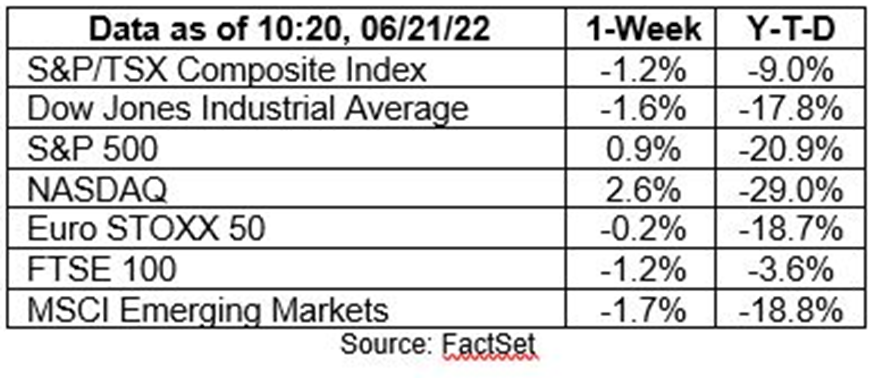Weekly Market Commentary June 23rd, 2022
The Markets
The fight against inflation intensified.
Last week, the Federal Reserve (Fed) delivered a message that it is serious about fighting inflation. The Federal Open Market Committee (FOMC) lifted the federal funds target rate by 0.75 percentage points. The fed funds rate is now 1.50 percent to 1.75 percent. For reference, the overnight rate in Canada is also currently at 1.50 percent.
The Fed also has begun to shrink its $9 trillion balance sheet by selling Treasury securities and agency mortgage-backed securities, a process known as quantitative tightening (QT), reported Kate Duguid, Colby Smith, and Tommy Stubbington of Financial Times (FT). The Fed’s balance sheet expanded greatly during the past few years as it engaged in quantitative easing (QE). QE entailed buying Treasury and agency securities to ease financial conditions, strengthen the economy, and support markets during the pandemic.
The effect of QT should be “roughly equivalent to raising the policy rate a little more than 50 basis points on a sustained basis,” according to a paper published by the Fed in June. Although, the authors stated there was considerable uncertainty associated with their estimate as the Fed has only attempted QT once before.
Global markets weren’t enthusiastic about the fact that the Fed and other central banks are tightening monetary policy. Harriet Clarfelt and colleagues at FT reported, “US stocks have suffered their heaviest weekly fall since the outbreak of the coronavirus pandemic, after investors were spooked by a series of interest rate increases by big central banks and the threat of an ensuing economic slowdown.”
It’s likely that markets will continue to be volatile, according to the CBOE Volatility (VIX) Index®, which measures expectations for volatility over the next 30 days. The VIX is known as Wall Street’s fear gauge. Last week, it rose to 31. That’s well above its long-term average of 20, but still far below the early pandemic peak, where the VIX briefly went above 80.
Last week, major stock indices tumbled, and yields moved higher across much of the yield curve. If you have any questions or concerns about your investment portfolio or current market events, please don’t hesitate to get in touch with us.

Is the bond market or stock market a better recession predictor?
The stock market has been dropping, but that doesn’t necessarily mean a recession is ahead. The stock market isn’t very accurate when it comes to predicting recessions.
In 1966, following two decades of almost uninterrupted economic growth and stock market gains, a bear market arrived. Stock investors feared a recession might be ahead, and the S&P 500 Index dropped 24 percent over eight months before rebounding and moving higher.
Economist Paul Samuelson, the first person to win a Nobel Prize in economics, quipped, “The stock market has predicted nine out of the last five recessions. A fact check of Samuelson’s off-the-cuff remark in 2016 found that he was right. Bear markets in stocks lead to recessions about 53 percent of the time, reported Steven Liesman of CNBC.
In other words, the stock market has about the same predictive value for recessions as a coin toss. The government bond market has a far better record.
In normal circumstances, yields on government bonds rise as maturities get longer. So, a two-year bond will normally yield less than a 10-year bond. On occasion, shorter-maturity government bonds yield more than longer-maturity bonds. This is unusual because investors usually want to earn more when they lend money for a longer period of time. When two-year government bonds yield more than their 10-year counterparts, we have an inverted yield curve.
An inverted yield curve is a more reliable indicator that a recession is ahead. Alexandra Skaggs of Barron’s explained, “In a recent study of yield curve inversions, BCA Research found that the gap between 2- and 10-year yields has inverted before seven of the past eight recessions...The gap between 3-month and 10-year yields has a better record, calling all 8 recessions without a false signal.”
Weekly Focus – Think About It
“My interest is in the future because I am going to spend the rest of my life there."
—Charles Kettering, engineer and inventor
Recent Videos:




Eric Muir
B.Comm. (Hons.), CIM®, FCSI
Portfolio Manager
Tracey McDonald
FCSI, DMS, CIM®
Portfolio Manager
Derek Lacroix
BBA, CIM®, CFP®
Associate Financial Advisor
P.S. Please feel free to forward this commentary to family, friends, or colleagues. If you would like us to add them to the list, please reply to this email with their email address and we will ask for their permission to be added.


